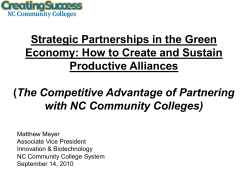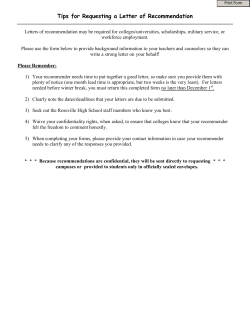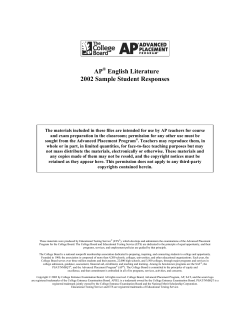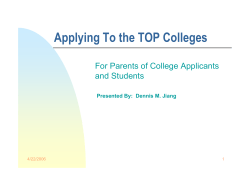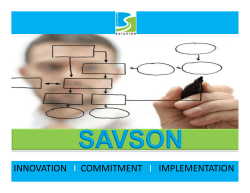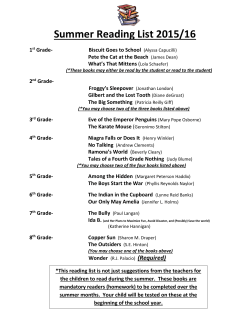
ALBUQUERQUE SCHOOL OF EXCELLENCE High School Program Presentation October 7, 2014
ALBUQUERQUE SCHOOL OF EXCELLENCE High School Program Presentation October 7, 2014 Our mission • The mission of Albuquerque School of Excellence is to provide a safe and collaborative environment which will cultivate the academic and social development for all students regardless of their socio-economic status by emphasizing math, science, and technology for the purpose of students setting and meeting higher education goals. • “There is no doubt that to advance our economy and our society we need to create the next great technology innovations, not just consume them. That’s why there is such urgency for the U.S. to develop a stronger workforce of experts in science, technology, engineering, and math (STEM)” Rodney Adkins, Senior Vice President of IBM STeM • Graduation Requirements • Graduation Plan • • • • Road to College AP courses Dual Credit Courses Financial Aid • UNM • HARVARD • Q-A Agenda • In order for a student to graduate at Albuquerque School of Excellence, students must fulfill: • • • • High school credit requirements State Testing Requirements Proof admission by a 4 year college At least 100 community service hours • 24.5 or 25 units to include: • • • • • • • • 4 units English 4 units math (one unit = or > than algebra 2) 3 units science (2 w/lab) 3.5 units social science, including United States history and geography, world history and geography and government and economics, and .5 unit New Mexico history 1 unit physical education 0.5 or 1 unit of health education* (may be taken in middle school) Starting from Class of 2018 – Freshmen in 2013-14 1 unit career cluster, workplace readiness or language other than English 7.5 units electives Graduation Plan • One of the above units must be honors, Advanced Placement, dual credit, or distance learning. • To graduate, a student must meet the cut score for high school graduation assessment on 11th grade SBA or use a portfolio alternate demonstration of competency. • * Note for future classes: For students entering the eighth grade in the 2012–13 school year, a course in health education is required. Graduation Plan • Students are expected to pass state-required standardized tests in five subject areas: • Reading (student take the NM Standards Based Assessment or SBA) • Math (students take the SBA) • Science (students take the SBA) • Social Studies (students take End of Course exams through their history, economics or government classes) • Writing (students take End of Course exams through their English classes) • There are several ways for students to demonstrate competency in addition to passing SBA or End of Course exams. These include minimum scores on such tests as the PLAN, ACT, PSAT, SAT, AP and others. State testing requirements and alternatives State testing requirements and alternatives • To graduate, students are requires to apply several colleges, to follow the steps of admission and to receive a proof admission from a 4 year college. • Students cannot get paid for the work, nor can they fill a position that would normally be a paid position. • Service MAY NOT be performed for family members or for profit making organizations. • Community service must be completed at a non-profit organization; therefore students should ask the organization or business if they are non-profit prior to performing activities. College Admission and Community Service • ASE high school course work ASE High School course work Road/Pathway to College • · Get ready for challenge in high school. “The ultimate measure of a man is not where he stands in moments of comfort and convenience, but where he stands at times of challenge and controversy.” by MLK, Jr. • · Learn more about high school graduation requirements. • · ABQ SCHOOL OF EXCELLENCE FIELD TRIP ACTIVITY: University of New Mexico Trip • · ABQ SCHOOL OF EXCELLENCE PARENT ACTIVITY: Student/parent Nights first week of February. 8th Grade- Rising stars • • • • • • • • · Start working on PSAT/SAT or ACT Tests. · Open a NAVIANCE account to learn more about colleges. · Attend SAT/ACT/PSAT courses/nights when available. · Be open and honest about your interests when you meet with your counselor to discuss course registration for the next school year. · Find one or more extracurricular activities that interest you - consistency and commitment! Colleges like to see that you've done something outside your coursework for four years. · Create a file to keep copies of report cards, a record of honors and awards, and a list of extracurricular activities (i.e. clubs and/or sports involvement at school, volunteer work, community service, and paid employment). · ABQ SCHOOL OF EXCELLENCE FIELD TRIP ACTIVITY: Campus Visit to New Mexico Institute of Mining and Technology OR Northern New Mexico College and Institute of American Indian Arts · ABQ SCHOOL OF EXCELLENCE PARENT ACTIVITY: Student/parent Nights first week of October. 9th Grade- Freshmen • • • • • • • • • · Continue working on PSAT-SAT and plan to take PSAT in October 15. · Updated your NAVIANCE account to learn more about colleges. · Attend SAT/ACT/PSAT courses/nights when available. · When you meet with your counselor to discuss course registration for the next school year make sure you are pursuing a curriculum that reflects your ability and potential - are you challenging yourself sufficiently? Talk to your teachers about course selections. · During school breaks, visit a few colleges to get a feel for different campus sizes (small, medium, large) and locations (urban, suburban, rural). · Continue to expand and document your extracurricular involvements and outside interests. · Attend NACAC Fall College Fair in Denver, CO on October 5 or Phoenix, AZ on October 13. · ABQ SCHOOL OF EXCELLENCE ACTIVITY: Campus Visit New Mexico State University and UT-El Paso · ABQ SCHOOL OF EXCELLENCE PARENT ACTIVITY: Student/parent Nights last week of September. 10th Grade- sophomore • • • • • · · · · · Take the PSAT in October 15 (National Merit qualifying test). Discuss SAT/ACT test prep options with your counselor. Update your NAVIANCE account to learn more about colleges. Attend SAT/ACT/PSAT courses/nights when available. Attend NACAC Fall College Fair on October 5 in Denver, CO. • Field trip will begin on Thursday, October 3 and end October 5. • · Continue extracurricular commitments - consider a leadership role! • · ABQ SCHOOL OF EXCELLENCE ACTIVITY: Campus Visit to Denver and US Air Force Academy Field Trip. • · ABQ SCHOOL OF EXCELLENCE PARENT ACTIVITY: Student/parent Nights first week of September. 11th Grade- Juniors FALL • · January - March: Set up an appointment with your counselor to discuss standardized test registration, courses for senior year, and to create a preliminary list of colleges. • · Register/Take the SAT (www.collegeboard.com) and ACT (www.act.org) at least once, and preferably twice. • · Find out if any SAT: Subject Tests are required by colleges you are considering. • We urge our students to take 2 SAT SUBJECT tests and 2 SAT tests before application deadline(s) which start in November 1 of Senior Year. • · Research college list using, guidebooks, the internet, and college visits. Talk to current students and alumni. • · Modify and update college list as your interests become clearer. • · Update your resume with current activities and leadership roles. • · Investigate sources of merit aid at schools of interest. • · ABQ SCHOOL OF EXCELLENCE ACTIVITY: Campus Visit to Texas Universities (UT-Austin and Houston Universities) during Spring Break in April 2014. • · ABQ SCHOOL OF EXCELLENCE PARENT ACTIVITY: Student/parent Nights first week of March 11th Grade- Juniors spring • · • · · Schedule an appointment with your college counselor. Decide what major you are interested in, what you like and what you want TO BE. • • • • • · · · · Check whether the colleges you may apply have the major you are interested in. If needed, register to re-take SAT/ACT. Know your application deadlines! Send SAT/ACT scores to colleges. Pay attention to scholarship announcements and deadlines. Some websites: • • • • • • • • • 1. 2. 3. 4. 5. 6. 7. 8. 9. www.fastweb.com www.zinch.com www.collegeboard.org www.financialaid.com www.collegenet.com www.thesalliemaefund.org www.collegescholarships.org www.schoolsoup.com www.scholarshipexperts.com • • • • · Meet with college representatives as they visit our campus. · If possible, visit your top college choices - go to classes and stay overnight in a dorm. · Apply for a PIN # for the FAFSA: www.pin.ed.gov · ABQ SCHOOL OF EXCELLENCE ACTIVITY: Campus Visit to MIT, Harvard, Yale and Brown University (Massachusetts-Boston) Field Trip. • · ABQ SCHOOL OF EXCELLENCE PARENT ACTIVITY: Student/parent Nights last week of August. 12th Grade- SENiors FALL • • • • • Fill out the FAFSA online (available January 1, 2015): http://www.fafsa.ed.gov/ Get financial aid advices from colleges. May 1: Students notify colleges of their enrollment. Be sure to send your deposit. June: Final transcripts sent to colleges by counseling office. Enjoy your final months at ASE, and do your best to finish the year on an academic high note. • ABQ SCHOOL OF EXCELLENCE ACTIVITY: Campus Visit to prospective colleges’ field trip. (OPTIONAL FIELD TRIP) • ABQ SCHOOL OF EXCELLENCE PARENT ACTIVITY: Student/parent FINANCIAL aid Night last week of January. 12th Grade- SEniors spring Best Resources • College Counselor • Teachers • Family/friends • College fairs • www.bestcollegepicks.com Criteria to Consider • Affiliation • Academic Environment • Size • Community • Location • Housing • Student Body • Financial Aid • Support Services • Activities/Social Clubs • Athletics • Specialized Programs College Search Apply Broadly • Reach/Dream: Your dream college (1-2) • Match/Fit: You meet the minimum requirements (2-3) • Safety: You exceed the minimum requirements (1-2) Admission Strategy What are Colleges Looking for When They Review an Application? • Grades in academic classes all 4 years / School Achievement • Levels of academic classes • Grades in all other courses • Standardized Test Scores • Work/Extra Curricular Activities • Special Talent • Essay or Writing Sample • Counselor Recommendation • Teacher Recommendation(s) • Student’s Demonstrated Interest • Interview (if required) • Diversity (Geographic/Ethnic) • Ability to Pay (unless need blind institution) • Legacy • Grades in academic classes all 4 years / School Achievement • Levels of academic classes • Grades in all other courses • PERSONAL DEVELOPMENT • Standardized Test Scores • ACT/SAT Camps or Trips to EXPEDITION/EXPLORATION • Work/Extra Curricular Activities • VOLUNTARY PUBLIC SERVICE, PERSONAL DEVELOPMENT, PHYSICAL FITNESS, EXPEDITION/EXPLORATION • Special Talent • PHYSICAL FITNESS • Essay or Writing Sample • PERSONAL DEVELOPMENT College Readiness and Leadership Program Types of Admission • Rolling Admission – the college will • Early Action – a plan offered that invites early application but does notify the student as soon as a not require the student to attend if decision has been rendered. accepted. • Regular Decision – the traditional • Single Choice Early Action-The application option. Decisions are student can only apply to one normally rendered by early April. school but is not required to • Early Decision - allows a student to attend if accepted. apply early to one college with a • Open Admission – students are commitment to attend if accepted. accepted upon application – If accepted, the student must usually community colleges. withdraw all other applications. College Entrance Exams SAT Reasoning Test - designed to assess skills and application of knowledge www.collegeboard.org SAT Subject Area Tests - one hour content based test www.collegeboard.org ACTs - are content based tests with an optional writing section www.actstudent.org The above web addresses will have information regarding registration, fees and a complete listing of all dates and deadlines. SAT vs. ACT SAT • Structure is Critical Reading, Math and Writing • There is a penalty for wrong answers • Test is scored 200-800 per section and 2400 is the highest possible combined score ACT • Structure is English, Reading, Math and Science Reasoning (Optional writing) • There is no penalty for wrong answers • Test is scored 1-36 per section and 36 is the highest possible composite score • Students can choose which composite score to send to colleges Our college code is 321-034 • We typically recommend testing once in the spring of junior year and once in the fall of senior year. • Your child’s college counselor will assist in creating an appropriate testing timeline Standardized Testing THE COLLEGE VISIT • If possible, visit the colleges you are considering. • Call ahead or check college website to make an appointment for a campus tour/information session. • Ask questions of the tour guide or other students on campus. • Try to eat in a campus dining facility. • If it’s not included on the campus tour, ask to visit a dormitory. • Students are allowed 2 excused college visit days per year if pre-planned. What should students do? • Work hard to achieve the best grades possible. • SAVE GRADED PAPERS • Use CHOICES and Naviance to generate initial list of schools to bring to college counselor meeting • Attend College Fairs • Make sure all content on Facebook is appropriate • Create an appropriate e-mail address • Create an ACT/SAT timeline with your college counselor • An individual student conference meetings • An open invitation for your child to stop by with questions/concerns • Open Communication – we will usually call back within 24 hours • Assistance throughout the process • Various Programming/activities What Should Your Expectations be of Us? The Advanced ® Placement Program Why should I take the AP Exam even if I’m not looking to earn credit or placement? • Stand out in the admissions process • Advanced Placement Program® (AP®) courses give you a head start on college. Taking the end-of-course AP Exam sends a powerful message to colleges and universities that a student is ready for them, and can enable students to gain admission, college credit, and placement into advanced courses. • Earn academic scholarships and awards • Some colleges honor and grant scholarships, fellowships to AP scholars. • Experience a college-level test • AP Test is a college-level test prepared by college professors. • Be a step ahead/Earn college credits • Many colleges grant credit based on a 3 or better on an AP test. Students who take AP courses and exams are much more likely than their peers to complete a bachelor’s degree in four years or less. Source: Camara, Wayne (2003). College Persistence, Graduation, and Remediation. College Board Research Notes (RN-19). New York, NY: College Board. 70 61 60 45 50 40 29 30 20 10 0 No AP One AP AP and College Success ™ Two+ AP What’s the difference between AP and honors? • AP courses are designed and updated annually to reflect what’s being taught in cutting-edge college courses. • Students receive an external evaluation— the AP Exam—which is scored by college faculty from around the world who verify that the student has mastered collegelevel studies. Most of the nation’s colleges and universities, plus colleges and universities in 24 other countries, grant students admission, credit, and/or placement for qualifying AP Exam grades. For example, at Princeton, students can use qualifying AP Exam grades to: • Graduate in three or three-and-a-half years • Enter upper-level courses • Fulfill a foreign language requirement Why take the AP Exam? • Some colleges award “credit” for qualifying AP Exam grades. This means you actually earn points toward your college degree. • Others award “advanced placement.” This means you can skip introductory courses, enter higher-level classes, and/or fulfill general education requirements. What’s the difference between credit and placement? Increase your options College credit can allow you to move into upper-level college courses sooner, pursue a double major, and gain time to study and travel abroad: “As a freshman, I was able to skip general ed requirements and head straight into the higher-level classes I wanted to take. Taking AP Exams literally saved me semesters of time.” —Brent Wiese, University of Iowa Save money If you earn a qualifying grade on an AP Exam, you can receive credit for the equivalent course at thousands of colleges and universities: “I took AP throughout high school because it was the most interesting and well-taught program offered. When I reached college, I realized that I had accumulated a year’s worth of credits. I graduated from Michigan’s undergraduate business school a full year early, saving $30,000 and a year’s time.” —Nikki Baker, University of Michigan • AP WORLD HISTORY • Testing Date: Thursday, May 14, 2015 • AP US HISTORY • Testing Date: Friday, May 8, 2015 • AP ENGLISH LANGUAGE • Testing Date: Wednesday 13, 2015 • AP ENGLISH LITERATURE • Testing Date: Wednesday 6, 2015 • AP US GOVERNMENT • Testing Date: Tuesday, May 12, 2015 • AP PHYSICS I or II • Testing Date: Wednesday 6, 2015 • AP CALCULUS AB • Testing Date: Tuesday, May 5, 2015 AP courses offered at ASE: There is an $89 fee for each AP Exam, which the College Board uses to: 1) develop, print, ship, and score the exams 2) subsidize teacher training 3) develop classroom resources 4) support educational initiatives AP Exam fees Dual Credit at CNM Community College • FIN 1010 – Financial literacy (2013 & 2014) • Requires no admission criteria & Online • May not be transferred or credit to UNM for advance purpose • Accuplacer/ACT/SAT test score requirement for most courses Test Minimum Score SAT Critical Reading: 330-800 –Reading Critical Reading: 330-800 –Sentence Skills Math 460-490 – College Level Math ACT Reading: 18-36 –Reading English: 23-36 –Sentence Skills Math: 23-24 – College Level Math Reading: 80-120 –Reading English: 110-120 –Sentence Skills Math: 60-85 – College Level Math Accuplacer • On Campus – Min student enrollment 12 • Online classes or At CNM campus – Scheduling issues Dual Credit • Savings are only the first of many benefits. The Dual Credit program allows you to: • Prepare for certification in a variety of career fields • Complete General Education coursesfor transfer to four year institutions • Enjoy smaller classes and personalized attention from faculty • Enrich your life by exploring programs not available at your high school • Meet new friends who share your interests Why Should You Consider Dual Credit? • Federal • www.fafsa.gov • State • http://http://hed.state.nm.us/ • Institution • Search University websites • Private • www.fastweb.com / www.zinch.com / www.collegeboard.org • Grants (not repaid) • Loans • Employment • Scholarships (not repaid) • Merit Based • Need Based FINANCIAL AID • http://scholarships.unm.edu/scholarships/ • Generally MERIT based scholarships UNM • https://college.harvard.edu/financial-aid/net-price-calculator • Generally NEED based scholarships HARVARD Which one do you prefer? • Thank you so much for attending… • QUESTIONS / CONTACT: • Ed Orsun, M.Ed., M.S. • ed101@abqse.org ASE High School
© Copyright 2025
